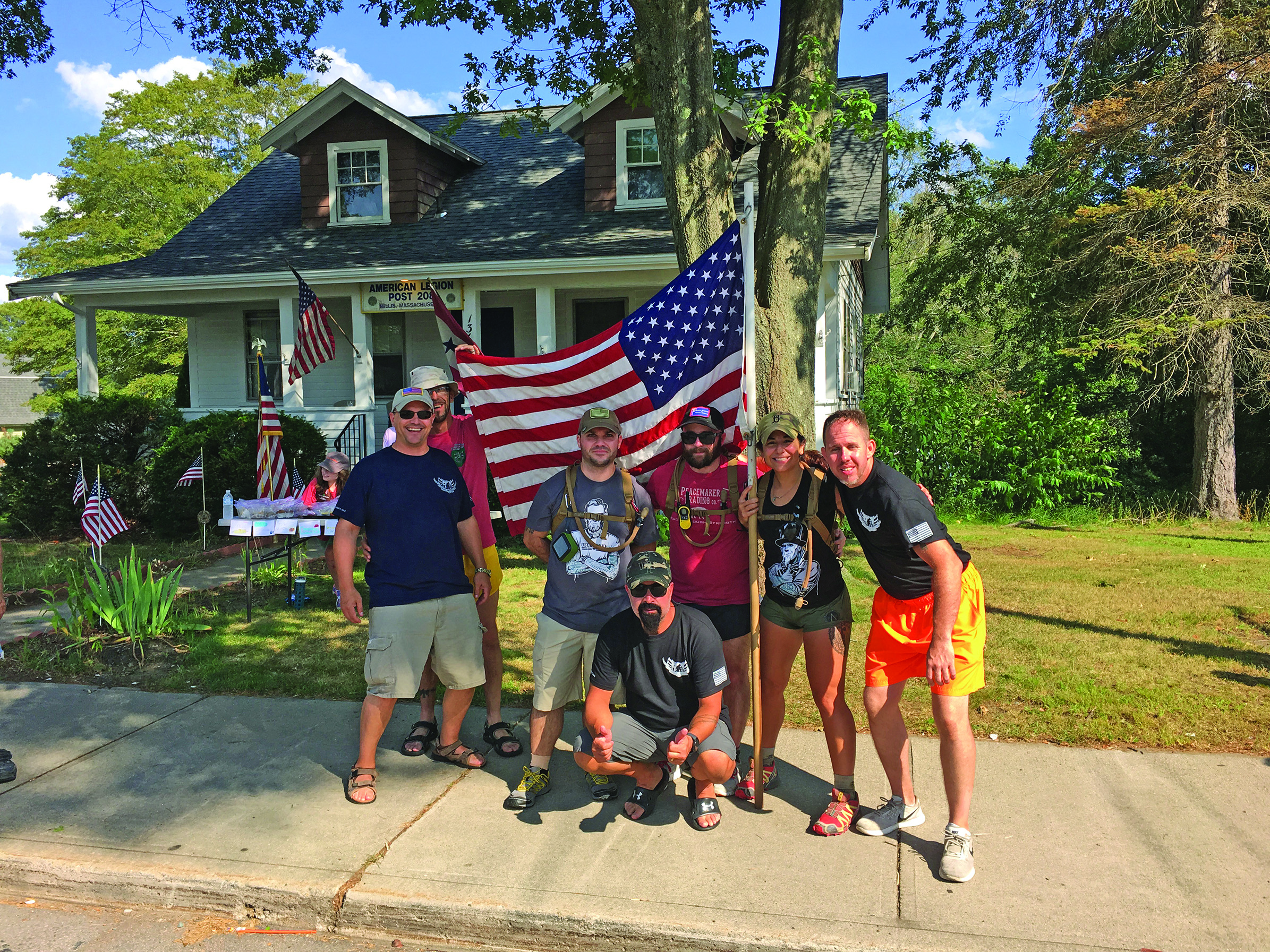Twenty veterans each day. According to the most recent widespread analysis by the Department of Veterans Affairs, that’s the number of veterans lost not on the battlefield, but back home, by their own hands, each day – about 7,300 each year. Veterans and community members from the Commonwealth of Massachusetts who have been impacted by suicide, took to the streets with a ruck march across Massachusetts in late August to bring awareness to the epidemic of veterans’ suicide and the needs of veterans.
Vet Ruck New England was a 200-mile, nonstop, day and night, ruck march through about 45 small towns across all of Massachusetts to raise awareness of the needs of our veterans.
“We wanted to do something that would raise awareness on a grand scale. It was about how we were willing to walk this far to talk to this many officials and townspeople to raise awareness that there are needs for vets in transition,” says Darren Bean, president of the Warrior Thunder Foundation, Inc., whose mission it is to provide programs for former and current service members and their families in New England.
The team of 12 started at Bates Memorial State Park in Hancock, Mass. and finished at Plymouth Rock. The ruck left Natick in early afternoon and reached the town of Millis just around 4 p.m. on Saturday, August 19th, stopping at the American Legion Post 208 and soon after receiving a warm welcome on Route 109 from community members, police and fire officials. The trek continued into Medway, turning at Oakland Street toward Franklin, where a welcome was planned at about 6 p.m. at the Rob Pirelli memorial on Main Street, after which it moved through Wrentham. (Pirelli was killed in action while serving his country in Iraq.)
According to Bean, members of the Vet Ruck New England team “are all super athletic types. They do the Spartan races, all those crazy events, and they wanted to kind of contribute in their way,” he says. Nine members are veterans themselves.
The event, he says, was “not about endurance, not about what we can do, but what we’re willing to do, suffer for 72 hours, carry that burden that veterans carry.”
The ruckers welcomed community members to walk with them for small portions of their journey, to raise awareness of issues veterans face, which can lead to suicide.
“There’s a lot of members of our team who have been affected by veterans’ suicide, myself included,” says Bean, who lost his friend, Larry, who had served in Somalia, Haiti and twice in Afghanistan.
Ruck team member Kristen Heavens, who is currently serving in the Army Reserves, says, “My grandfather, who was a Retired Navy Veteran of 20 years took his own life. I also had a family friend whom I considered my little brother take his life 5 years ago. I see the toll the loss of my grandfather takes on my mom’s family every day.”
Bean says the problem is growing among younger veterans.
“The younger population (of veterans lost to suicide) is increasing,” says Bean. “The younger vets, who are coming out of the Iraq and Afghanistan wars – they are 18 years old when they go into these wars, that weren’t extremely popular, are long exhausting, and now they are home, and they get great support from the American people, but they are lost because they didn’t have much when they got started, and now they have PTSD or other problems, and they have a hard time.” For these young vets back home, the jobs they hold stateside may offer fewer responsibilities and stimulation than they had while serving.
The Warrior Thunder Foundation, says Bean, is interested in helping veterans before they reach that precipice.
“It’s not just PTSD, but the depression, anxiety, stress-of-life transition, social interaction skills, maintaining employment and homes. The Warrior Thunder Foundation prevented five veterans from becoming homeless this year,” he says. “We want to focus on health, relationships, and wellness, on fixing the problem. Here are some techniques to help you get to sleep. Here’s how you can do some meditation at your desk or when you have pain in your arm. Eat right, drink water, take a vitamin, meditate, pray, take care of yourself.”
Many veterans, says Bean, himself included, are in “constant discomfort,” which can be managed to some degree by positional techniques rather than more opioids. Warrior Thunder has supported equine therapy for vets, as well as a health and wellness retreat in Stockbridge at the Kripalu Yoga and Healing Center.
Bean says the Warrior Thunder Foundation feels it’s important to bring together a diverse community “to help bring back our veterans and help them transition into the community.” That, he says, makes the community stronger. “Vets have a lot to offer, and the community has a lot to offer the vets.”
If you would like to donate to Vet Ruck New England, you can easily text a donation to “Vetruck” to (508) 433-3557.
Coming up this month will be Warrior Thunder Foundation’s 8th Annual Motorcycle Ride, on September 9, 2017. The ride will leave from the Medfield American Legion and is $20 per motorcycle, $15 per passenger. For more information, visit the Warrior Thunder Foundation website, www.warriorthunderfoundation.org.
200-Mile Trek Made to Raise Awareness of Suicide among Veterans

Issue Date:
September, 2017
Article Body:
Column:
